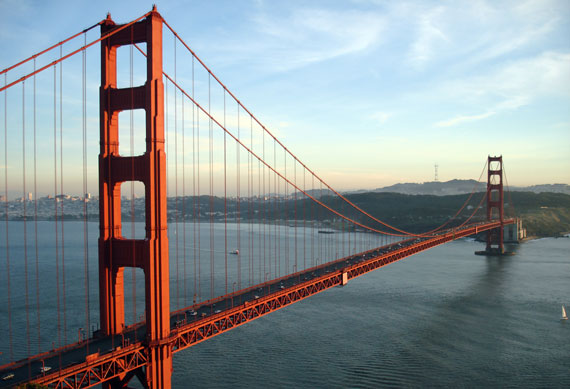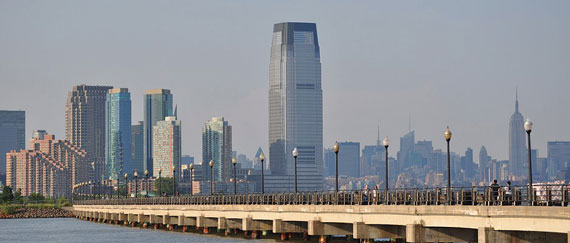Airbnb’s worldwide reach is unquestionable. The home-sharing company operates in more than 34,000 markets across the globe. But not all cities treat it the same.
Some, like New York and San Francisco, have battled Airbnb head on, setting significant limits on its services. Others, such as Jersey City, have put out the welcome mat and worked to legalize short-term rentals.
Below is a rundown of how key cities have responded to the controversial startup — and how, in some cases, the company has pushed back.

San Francisco
San Francisco, California
While San Francisco is home to Airbnb’s headquarters and other tech startups, the city has also been an intense political battleground for the company. Airbnb scored a big victory back in 2014 when the City on the Bay legalized rentals under 30 days. But the measure came with a bunch of caveats: It required Airbnb hosts to be permanent residents of their units, to register their homes with the city and to pay a 14 percent tax on their rental income — the same amount as hotels in the city.
It also required renters to have $500,000 in liability insurance and capped the amount of time hosts could rent out their entire homes to 90 days a year. (Renting a bed or a room with the host on site is legal year round.)
In November, Airbnb defeated an extremely contentious ballot measure pushed by housing advocates and hospitality industry groups after a legislative proposal against Airbnb came to a deadlock in the city legislature. Proposition F, dubbed the “Airbnb Initiative,” would have dropped the cap on the length of time hosts could rent their homes to 75 days. It would also have strengthened enforcement and created new avenues for slighted neighbors to file lawsuits against Airbnb and its competitors.
Airbnb raised more than $8 million to fight the measure, one of the highest sums ever raised for a San Francisco ballot campaign and about 25 times what Prop F supporters were able to put together. In the end, 55 percent of voters said no to the measure. “This election was a victory,” said Christopher Lehane, Airbnb’s head of global policy, after the vote. “This effort shows that home sharing is both a community and a movement.”

Jersey City
Jersey City, New Jersey
Unlike San Francisco or its neighbor across the Hudson River, Jersey City has welcomed Airbnb with open arms. In October, Mayor Steven Fulop, a former Goldman Sachs trader-turned-political reformer, moved to create one of the country’s most accommodating short-term rental regimes.
His proposal, which became law in November, legalized Airbnb and similar services wholesale, only requiring hosts to pay the city’s 6 percent hospitality tax and with no limits on length of stay. Airbnb promised to take responsibility for collecting the tax itself. It already does in about two dozen cities.
“Airbnb is incredibly popular and growing rapidly,” Fulop told The Jersey Journal in October. “And while some people might have concerns about the sharing economy upending old ways of doing business, the best way to address those concerns is by engaging with these companies, not by pretending they do not exist.”
Austin, Texas
An early entrant in the short-term rental debate, Austin is the 10th largest Airbnb city in the U.S. with nearly 4,500 active listings as of February, according to AirDNA. The city moved to regulate short-term rentals back in 2012, although the law only took effect in January 2014.
Austin’s ordinance requires all hosts to register short-term rentals at a cost of $235, plus a $50 first-time registrant fee. Hosts are also required to provide a certificate of occupancy as well as proof of insurance and, in some cases, to pay a hospitality tax of 9 percent. In an effort to prevent a cottage industry of commercial Airbnb hosts who run full-time, whole-unit listings, sometimes many at once, the rules also limit the total number of certificates each host can get.
Last month, Austin’s City Council voted to add further rules to crack down on rowdy guests and to prevent price gouging.
The proposal passed 9-2 despite vigorous opposition from short-term rental firms. Airbnb released data prior to the vote purporting to show that the number of disturbances and commercial hosts in the city is significantly overstated. Meanwhile, Austin-based rival Homeaway launched an initiative called “Stay Neighborly” to increase compliance among hosts.
Raleigh, North Carolina
Although the Airbnb market here is tiny — roughly 250 listings, according to AirDNA — North Carolina’s capital has perhaps the toughest restrictions on short-term rentals in the country, prohibiting the services entirely in most parts of the city.
The rules are loosely enforced, however, according to the Raleigh News & Observer.
Late last year, the City Council proposed new, more liberal rules, which would allow most residents to rent up to two rooms in their homes without a special permit as long as there’s a designated manager
on site.
Owners of duplexes and triplexes, or homeowners looking to rent more than two rooms, would have to obtain a permit and pay an as-yet-undetermined fee.

Paris, France
Paris, France
The City of Lights is Airbnb’s single largest market, with more than 29,300 active listings, according to AirDNA. The rules governing short-term rentals in the city are primarily based on French national policy, which was updated in 2014 to allow short-term rentals of primary residences for no more than 120 days a year.
But in mid-2015, Paris officials began a crackdown, sending investigators door to door to uncover hosts violating those rules and threatening fines of 25,000 euros, the equivalent of $28,400.
The city carried out another similar enforcement action earlier this year.
Amsterdam, Netherlands
Amsterdam ranks among Airbnb’s top 10 cities outside the U.S., with roughly 9,400 active listings, according to AirDNA. Not surprisingly, the liberal city was one of the first to regulate short-term rentals.
After passing rules in 2012, it has updated them several times since. Today, residents can rent their homes for up to 60 days a year as long as they obtain permits, which cost about $800, and have their landlords’ permission. In addition, guests must stay for at least seven consecutive days. Hosts had also been required to collect a 5 percent tourist tax, but in 2014, Airbnb agreed to collect the tax itself.
But in a more hardline move, the City Council recently moved to clamp down on hosts who violate those rules. In what may be a unique government move, the city plans to scrape data from Airbnb’s site to identify illegal activity.
Toyko, Japan
Japan is Airbnb’s fastest-growing market. The company says the country has 27,000 listings total, up fourfold since 2015. About 11,500 are found in Tokyo. Nonetheless, short-term rentals are all but illegal here. The country’s hotel laws require anyone renting out a room to obtain a license, maintain a front desk, hold copies of guests’ passports as well as other onerous demands.
But Japan’s prime minister, Shinzo Abe, recently approved a federal guideline that could eventually legalize short-term rentals in certain parts of the country, including Tokyo.
Still, hosts will be required to provide at least 25 square meters of space, or 269 square feet; to explain trash-handling and emergency procedures in guests’ native tongues; and, more importantly, to only permit guests who will stay at least seven days. Relatively few Airbnb guests stay that long.